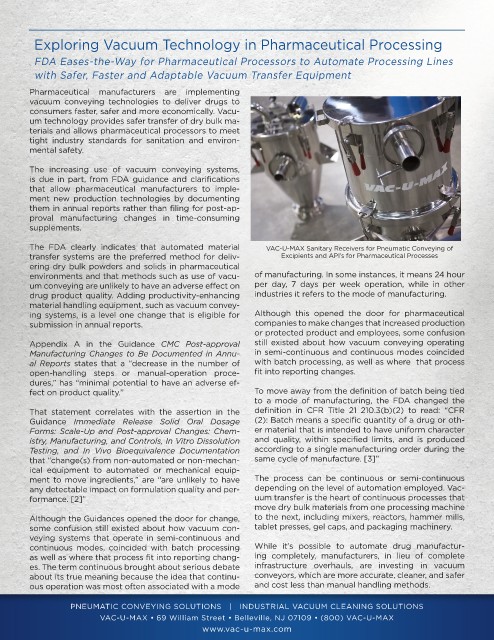Page 2997 - Flipbook_SolidDesignSoutheast2020
P. 2997
Exploring Vacuum Technology in Pharmaceutical Processing
FDA Eases-the-Way for Pharmaceutical Processors to Automate Processing Lines
with Safer, Faster and Adaptable Vacuum Transfer Equipment
Pharmaceutical manufacturers are implementing
vacuum conveying technologies to deliver drugs to
consumers faster, safer and more economically. Vacu-
um technology provides safer transfer of dry bulk ma-
terials and allows pharmaceutical processors to meet
tight industry standards for sanitation and environ-
mental safety.
The increasing use of vacuum conveying systems,
is due in part, from FDA guidance and clarifications
that allow pharmaceutical manufacturers to imple-
ment new production technologies by documenting
them in annual reports rather than filing for post-ap-
proval manufacturing changes in time-consuming
supplements.
The FDA clearly indicates that automated material VAC-U-MAX Sanitary Receivers for Pneumatic Conveying of
transfer systems are the preferred method for deliv- Excipients and API’s for Pharmaceutical Processes
ering dry bulk powders and solids in pharmaceutical
environments and that methods such as use of vacu- of manufacturing. In some instances, it means 24 hour
um conveying are unlikely to have an adverse effect on per day, 7 days per week operation, while in other
drug product quality. Adding productivity-enhancing industries it refers to the mode of manufacturing.
material handling equipment, such as vacuum convey-
ing systems, is a level one change that is eligible for Although this opened the door for pharmaceutical
submission in annual reports. companies to make changes that increased production
or protected product and employees, some confusion
Appendix A in the Guidance CMC Post-approval still existed about how vacuum conveying operating
Manufacturing Changes to Be Documented in Annu- in semi-continuous and continuous modes coincided
al Reports states that a “decrease in the number of with batch processing, as well as where that process
open-handling steps or manual-operation proce- fit into reporting changes.
dures,” has “minimal potential to have an adverse ef-
fect on product quality.” To move away from the definition of batch being tied
to a mode of manufacturing, the FDA changed the
That statement correlates with the assertion in the definition in CFR Title 21 210.3(b)(2) to read: “CFR
Guidance Immediate Release Solid Oral Dosage (2): Batch means a specific quantity of a drug or oth-
Forms: Scale-Up and Post-approval Changes: Chem- er material that is intended to have uniform character
istry, Manufacturing, and Controls, In Vitro Dissolution and quality, within specified limits, and is produced
Testing, and In Vivo Bioequivalence Documentation according to a single manufacturing order during the
that “change(s) from non-automated or non-mechan- same cycle of manufacture. [3]”
ical equipment to automated or mechanical equip-
ment to move ingredients,” are “are unlikely to have The process can be continuous or semi-continuous
any detectable impact on formulation quality and per- depending on the level of automation employed. Vac-
formance. [2]” uum transfer is the heart of continuous processes that
move dry bulk materials from one processing machine
Although the Guidances opened the door for change, to the next, including mixers, reactors, hammer mills,
some confusion still existed about how vacuum con- tablet presses, gel caps, and packaging machinery.
veying systems that operate in semi-continuous and
continuous modes, coincided with batch processing While it’s possible to automate drug manufactur-
as well as where that process fit into reporting chang- ing completely, manufacturers, in lieu of complete
es. The term continuous brought about serious debate infrastructure overhauls, are investing in vacuum
about its true meaning because the idea that continu- conveyors, which are more accurate, cleaner, and safer
ous operation was most often associated with a mode and cost less than manual handling methods.
PNEUMATIC CONVEYING SOLUTIONS | INDUSTRIAL VACUUM CLEANING SOLUTIONS
VAC-U-MAX • 69 William Street • Belleville, NJ 07109 • (800) VAC-U-MAX
www.vac-u-max.com

